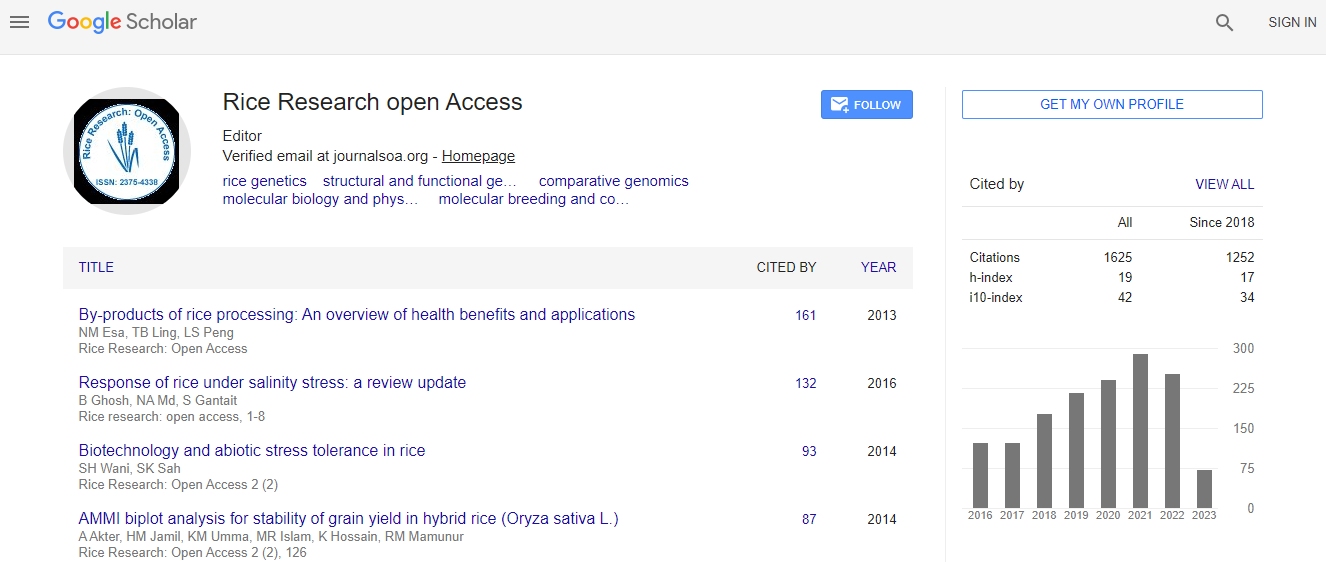Research Article
In-Silico Prediction and Functional Analysis of Salt Stress Responsive Genes in Rice (Oryza sativa)
| Jyotika Bhati1, Pavan Chaduvula K1, Anil Rai1, Kishore Gaikwad2, Soma Marla S3 and Sanjeev Kumar1* | |
| 1Centre for Agricultural Bioinformatics, ICAR-Indian Agricultural Statistics Research Institute, Pusa, New Delhi 110012, India | |
| 2ICAR-National Research Centre Plant Biotechnology, Pusa, New Delhi 110012, India | |
| 3ICAR-National Bureau for Plant Genetic Resources, IARI Campus, New Delhi 110012, India | |
| Corresponding Author : | Sanjeev Kumar Centre for Agricultural Bioinformatics ICAR-Indian Agricultural Statistics Research Institute, Pusa, New Delhi 110012, India Tel: 91-11-25841721 E-mail: sanjeevk@iasri.res.in |
| Received: January 22, 2016; Accepted: February 18, 2016; Published: February 25, 2016 | |
| Citation: Bhati J, Chaduvula KP, Rai A, Gaikwad K, Soma Marla S, et al. (2016) In- Silico Prediction and Functional Analysis of Salt Stress Responsive Genes in Rice (Oryza sativa). J Rice Res 4:164. doi:10.4172/2375-4338.1000164 | |
| Copyright: © 2016 Bhati J, et al. This is an open-access article distributed under the terms of the Creative Commons Attribution License, which permits unrestricted use, distribution, and reproduction in any medium, provided the original author and source are credited. | |
Abstract
The area for cultivation of rice on salt affected soil is increasing at very fast rate due to insensitivity towards following proper package and practices of crops production in order to increasing productivity of rice due to high population pressure in Asian countries. Therefore, it is important to identify genes and their regulatory elements for development of salt stress tolerance variety of rice. In order to identify genes responsible for salt stress in rice 7746 expressed sequence tags (ESTs), expressed in salinity stress condition, were mined from the different web recourses. The downloaded ESTs were clustered and assembled into 672 contigs. Biological functions were obtained only for 424 out of 672 contigs through Gene Ontology (GO). The remaining contigs were used for reconstruction, validation and annotation of salt stress genes. These contigs were mapped on to rice genome and full length gene sequences were designed. These designed candidate genes were further validated by means of a) Integrating with known salt stress related quantitative trait loci (QTL) on rice genome and b) Promoter analysis. In this study novel candidate genes were identified which may have a possible involvement in regulation of salt stress mechanism and may be useful in molecular breeding programme in rice for development of salt tolerance varieties through Molecular Assisted Breeding.

 Spanish
Spanish  Chinese
Chinese  Russian
Russian  German
German  French
French  Japanese
Japanese  Portuguese
Portuguese  Hindi
Hindi 
